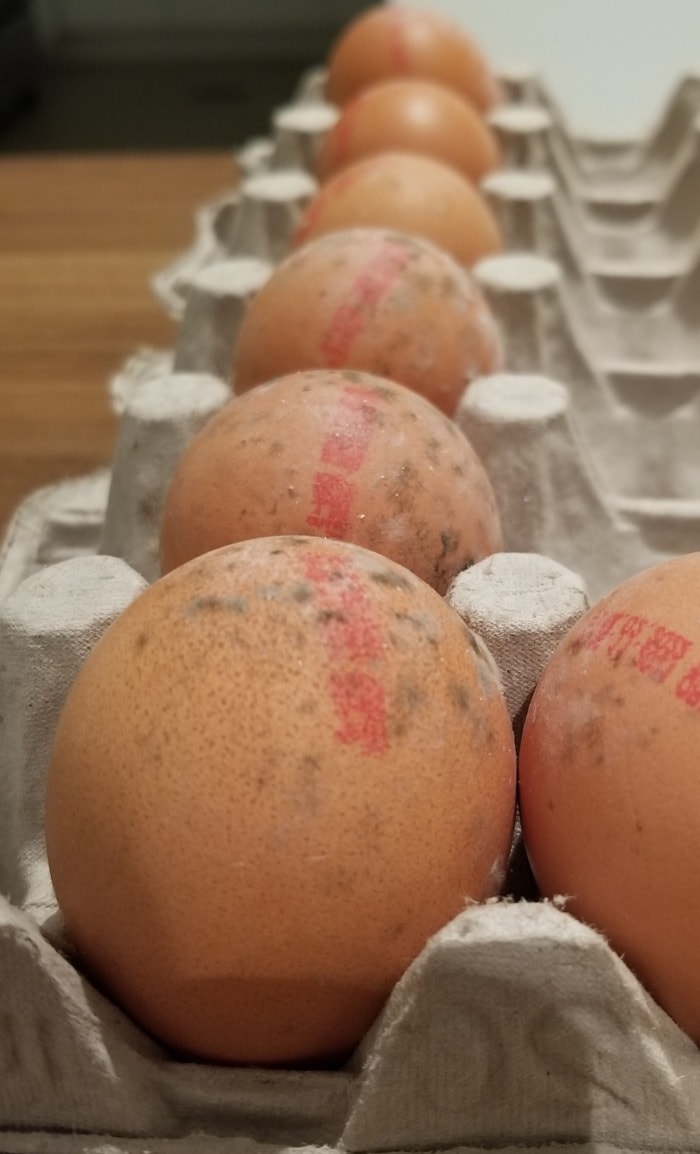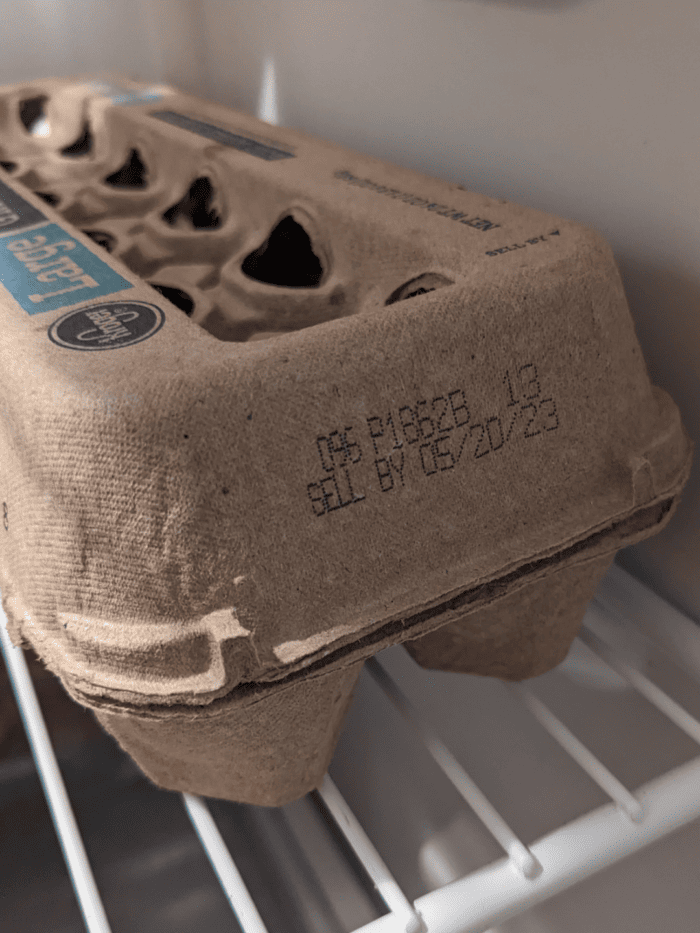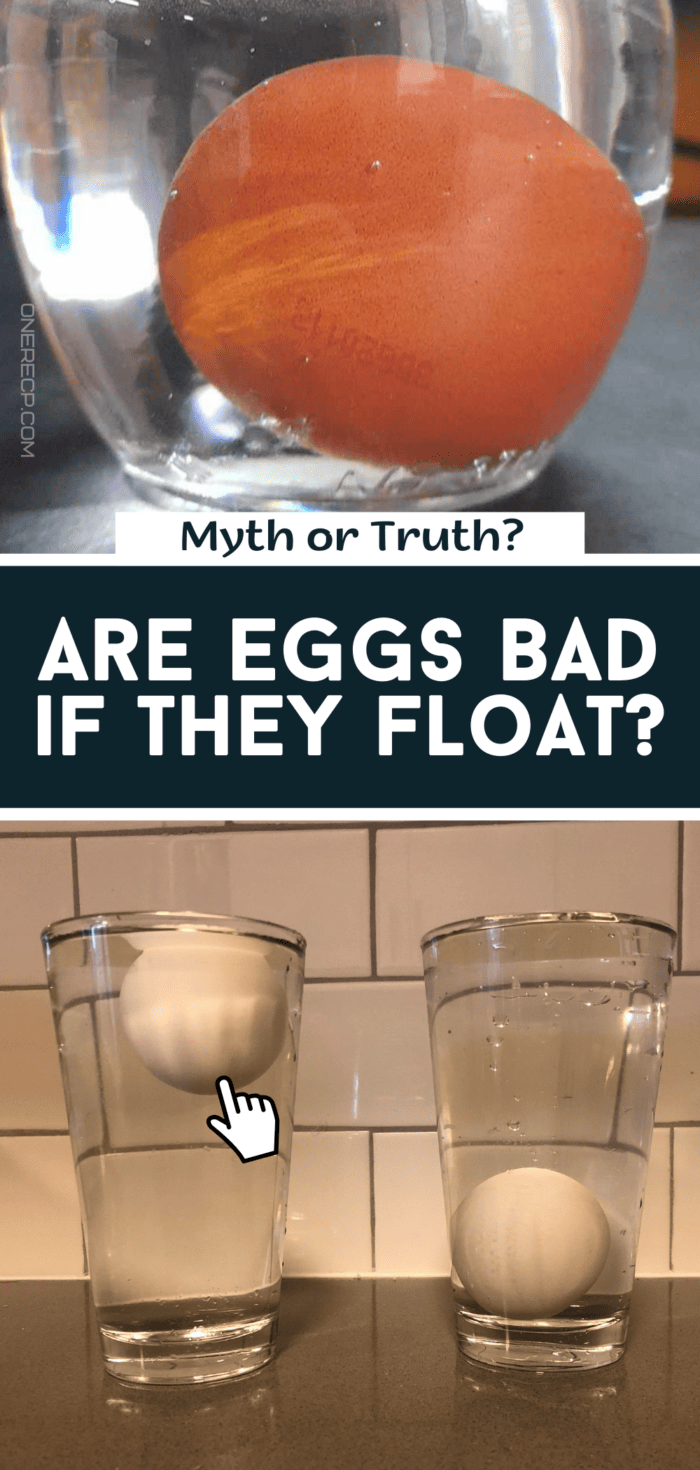I used to always hear that one of the most common ways to see if eggs are spoiled is to check their buoyancy in water.
But are eggs actually bad if they float in cold water?
Or is this just an elaborate myth that’s floating around the internet? To get to the bottom of this, we’ll take a close look at how age and spoilage affect buoyancy.
Let me help you to find out why some raw eggs float in water.
Are eggs actually bad if they float in water?
Eating a batch of spoiled eggs can cause serious health problems and lead to food poisoning.
Unfortunately, it’s not always easy to tell when eggs have gone bad since their date labels are often confusing.
As a result, many people resort to the egg float test to check if they’re eggs are still safe to eat.
And even though this method has been passed down through generations, it’s not the most accurate way to tell if eggs are bad.
The reason behind this is quite simple.
Egg shells have a porous structure that allows oxygen to pass through. As the egg ages, it starts to lose some of its moisture and fills with oxygen. With time it becomes less dense than water so it begins to float. Due to this, eggs that float in water are often simply old, but may still be edible.
Additionally, boiled eggs can float if there’s too much salt in the water.
This is because salt increases the density of water and makes the eggs lighter.
However, this rarely happens since you need quite a bit of salt to make water more dense than the eggs.
In most cases boiled eggs float because their air pocket expands from the heat.
Having said that, there are some cases in which egg floating might indeed point to spoilage.
If, for instance, an egg is contaminated with the Pseudomonas bacterium, the bacteria will start to produce hydrogen sulfide.
This will cause the egg to float in water since hydrogen sulfide is a gas that’s heavier than air.
As you can see, using the float test can lead to some dodgy results.
Fortunately, there are more reliable ways to tell when an egg is spoiled.
How to tell if eggs are spoiled?
There are a few methods you can use to determine if your eggs are spoiled.
You can check their expiration date, sniff them or perform a visual inspection.
Let’s take a look at each method in detail.
Perform a visual examination
Performing a visual inspection is one of the best ways to tell if an egg is still safe to eat.
Start by checking the egg shell for any abnormalities like cracks, slime or a powdery texture.
The presence of slime is an indicator of bacterial contamination, while the powdery texture is usually a sign of mold.

by mouthnoises
Cracks on the other hand facilitate the movement of bacteria and increase the risk of contamination.
In case the egg shell is intact, you should proceed by cracking the egg open in a small bowl or plate.
If you notice any form of discoloration such as black or pink spots, you should throw it out.
The only exception to this rule are blood spots that can appear in the yolk of some eggs.
Blood spots are tiny red droplets of blood that are the result of ruptured blood vessels.
They are completely natural and don’t affect the quality of the egg in any significant way.
You can also check the texture of the egg to determine if it’s still fresh.
Older eggs have less moisture so their yolk and albumen are more runny.
Check for unusual smells
This is probably the best and easiest method to tell if an egg has spoiled.
If your eggs have passed the scrutiny of your visual examination, you can check them for any unusual smells.
Spoiled eggs exude a foul smell that’s hard to miss!
This is a result of the accumulation of hydrogen sulfide.
Hydrogen sulfide gets released when the eggs start to decay and emits a strong sulfur smell.
If you don’t notice any unusual smell while the egg is still in its shell, you can crack it in a bowl or plate.
In case it smells off, you should throw it away and thoroughly clean the bowl with soap.
Otherwise, you should store the egg in an airtight container or use it for your cooking needs.
Check the expiration date

by emutts
Some egg packages carry a date label that can be used to determine the freshness of eggs.
There are several types of date labels, such as “EXP”, “Sell By” and “Best before”.
These code dates, however, aren’t synonymous. Each of them has to follow a certain set of rules and they usually convey different information.
According to the USDA, expiration dates such as “EXP” and “Sell By”, can be no more than 30 days than the day the eggs were packaged.
As their name suggests, these dates are mostly used by retailers to determine the shelf life of eggs.
The “Use before” and “Best before” dates however, indicate the maximum amount of time you can expect eggs to maintain their freshness in ideal conditions.
In other words, they cannot exceed more than 45 days after the eggs are packaged in a carton.
Lastly, there’s the pack date or Julian date, which indicates when the eggs were washed, graded and packaged. It comes in the form of a three digit code which represents the exact day of the year.
An egg carton with a pack date of 030, for instance, means the eggs were packaged on 30 January.
So how can you use all of this information?
Generally speaking, eggs can maintain their quality for up to six weeks. Therefore, it’s best to use the pack date or “Best before” label as a guideline.
If your carton only has an “EXP” or “Sell By” label, you should add two more weeks to the end date.
How to store raw eggs?
When they’re stored properly, eggs can last for up to six weeks before their quality starts to degrade.
And the most important factor that you should take into consideration is temperature.
Raw eggs need to be stored at a temperature of 40℉ or lower.
Storing them at higher temperatures increases the risk of bacterial contamination and decreases their shelf life.
For this reason, you should also not leave eggs unrefrigerated for more than 2 hours.
In addition, it’s best to keep eggs at the back or bottom of the fridge as the temperature there is the lowest.
Leaving them in the egg compartment might not be a good idea, since the temperature there is slightly warmer.
You can also keep raw eggs in the freezer for up to a year.
To do this, you should first whip them until they’re homogenous and then place them in an airtight container.
When you’re ready to use them, simply thaw them in the refrigerator overnight.
Also learn: Best Way to Store Peeled Boiled Eggs
My short recap
It’s always important to check the quality of your eggs before you cook them. However, using the float test might not be the best way to do this.
Even if your eggs float to the top, they might still be good to eat and you can end up tossing out a batch of perfectly good eggs.
On the other hand, they might sink to the bottom while being contaminated by bacteria or molds.
Therefore, the best way to judge their quality is by using your senses.
Remember that if you notice any unusual discoloration or foul smells, you should throw the eggs out.
Read next: Puffy Cloud Eggs Baked in The Oven
